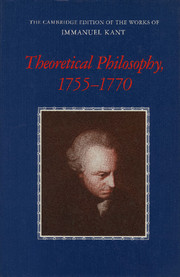Book contents
- Frontmatter
- Contents
- General editors' preface
- Preface
- Guide to abbreviations
- General introduction
- Introductions to the translations
- Résumés of the works
- A NEW ELUCIDATION OF THE FIRST PRINCIPLES OF METAPHYSICAL COGNITION (1755)
- THE EMPLOYMENT IN NATURAL PHILOSOPHY OF METAPHYSICS COMBINED WITH GEOMETRY, OF WHICH SAMPLE I CONTAINS THE PHYSICAL MONADOLOGY (1756)
- AN ATTEMPT AT SOME REFLECTIONS ON OPTIMISM (1759)
- THE FALSE SUBTLETY OF THE FOUR SYLLOGISTIC FIGURES (1762)
- THE ONLY POSSIBLE ARGUMENT IN SUPPORT OF A DEMONSTRATION OF THE EXISTENCE OF GOD (1763)
- ATTEMPT TO INTRODUCE THE CONCEPT OF NEGATIVE MAGNITUDES INTO PHILOSOPHY (1763)
- INQUIRY CONCERNING THE DISTINCTNESS OF THE PRINCIPLES OF NATURAL THEOLOGY AND MORALITY (1764)
- M. IMMANUEL KANT'S ANNOUNCEMENT OF THE PROGRAMME OF HIS LECTURES FOR THE WINTER SEMESTER 1765 — 1766 (1765)
- DREAMS OF A SPIRIT-SEER ELUCIDATED BY DREAMS OF METAPHYSICS (1766)
- CONCERNING THE ULTIMATE GROUND OF THE DIFFERENTIATION OF DIRECTIONS IN SPACE (1768)
- ON THE FORM AND PRINCIPLES OF THE SENSIBLE AND THE INTELLIGIBLE WORLD [INAUGURAL DISSERTATION] (1770)
- Section 1 On the concept of a world in general
- Section 2 On the distinction between sensible things and intelligible things in general
- Section 3 On the principles of the form of the sensible world
- Section 4 On the principle of the form of the intelligible world
- Section 5 On method in metaphysics concerning what is sensitive and what belongs to the understanding
- Factual notes
- Bibliographies of editions and translations
- Glossary
- Biographical-bibliographical sketches of persons mentioned by Kant
- Index
Section 4 - On the principle of the form of the intelligible world
Published online by Cambridge University Press: 18 December 2014
- Frontmatter
- Contents
- General editors' preface
- Preface
- Guide to abbreviations
- General introduction
- Introductions to the translations
- Résumés of the works
- A NEW ELUCIDATION OF THE FIRST PRINCIPLES OF METAPHYSICAL COGNITION (1755)
- THE EMPLOYMENT IN NATURAL PHILOSOPHY OF METAPHYSICS COMBINED WITH GEOMETRY, OF WHICH SAMPLE I CONTAINS THE PHYSICAL MONADOLOGY (1756)
- AN ATTEMPT AT SOME REFLECTIONS ON OPTIMISM (1759)
- THE FALSE SUBTLETY OF THE FOUR SYLLOGISTIC FIGURES (1762)
- THE ONLY POSSIBLE ARGUMENT IN SUPPORT OF A DEMONSTRATION OF THE EXISTENCE OF GOD (1763)
- ATTEMPT TO INTRODUCE THE CONCEPT OF NEGATIVE MAGNITUDES INTO PHILOSOPHY (1763)
- INQUIRY CONCERNING THE DISTINCTNESS OF THE PRINCIPLES OF NATURAL THEOLOGY AND MORALITY (1764)
- M. IMMANUEL KANT'S ANNOUNCEMENT OF THE PROGRAMME OF HIS LECTURES FOR THE WINTER SEMESTER 1765 — 1766 (1765)
- DREAMS OF A SPIRIT-SEER ELUCIDATED BY DREAMS OF METAPHYSICS (1766)
- CONCERNING THE ULTIMATE GROUND OF THE DIFFERENTIATION OF DIRECTIONS IN SPACE (1768)
- ON THE FORM AND PRINCIPLES OF THE SENSIBLE AND THE INTELLIGIBLE WORLD [INAUGURAL DISSERTATION] (1770)
- Section 1 On the concept of a world in general
- Section 2 On the distinction between sensible things and intelligible things in general
- Section 3 On the principles of the form of the sensible world
- Section 4 On the principle of the form of the intelligible world
- Section 5 On method in metaphysics concerning what is sensitive and what belongs to the understanding
- Factual notes
- Bibliographies of editions and translations
- Glossary
- Biographical-bibliographical sketches of persons mentioned by Kant
- Index
Summary
§16
Those who take space and time for some real and absolutely necessary bond, as it were, linking all possible substances and states, do not think that anything further is required in order to understand how a certain originary relation, as the fundamental condition of possible influences and the principle of the essential form of the universe, should belong to a plurality of existing things. For, since whatever things exist are, in their opinion, necessarily somewhere, it appears superfluous to them to enquire why these same things are present to each other in a fixed manner. For this, it seems to them, would be determined in itself by the entirety of space, which includes all things. But, apart from the fact that this concept, as has already been demonstrated, rather concerns the sensitive laws of the subject than the conditions of the objects themselves, even if you were to grant to this concept the greatest possible reality, it would still only signify the intuitively given possibility of universal co-ordination. Accordingly, the following question, which can only be solved by the understanding, remains untouched, namely: what is the principle upon which this relation of all substances itself rests, and which, when seen intuitively, is called space? The hinge, then, upon which the question about the principle of the form of the intelligible world turns is this: to explain how it is possible that a plurality of substances should be in mutual interaction with each other, and in this way belong to the same whole, which is called a world. We are not here contemplating the world in respect of its matter, that is to say, in respect of the natures of the substances of which it consists, whether they are material or immaterial. We are contemplating the world in respect of its form, that is to say, in respect of how, in general, a connection between a plurality of substances comes to be, and how a totality between them is brought about.
- Type
- Chapter
- Information
- Theoretical Philosophy, 1755–1770 , pp. 401 - 405Publisher: Cambridge University PressPrint publication year: 1992

